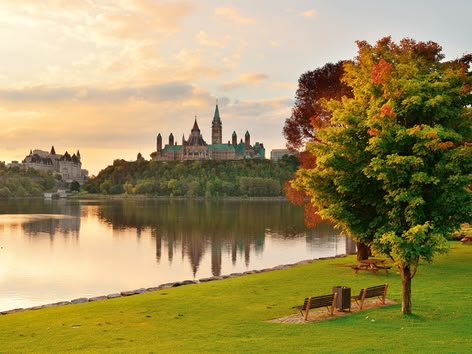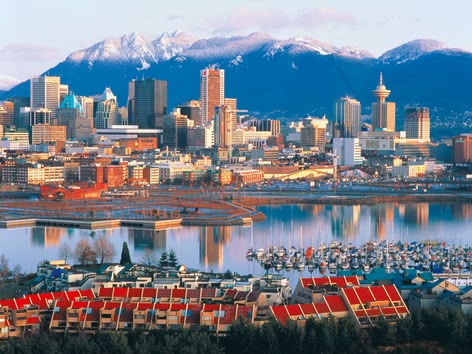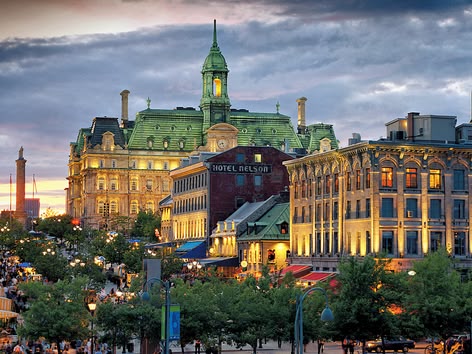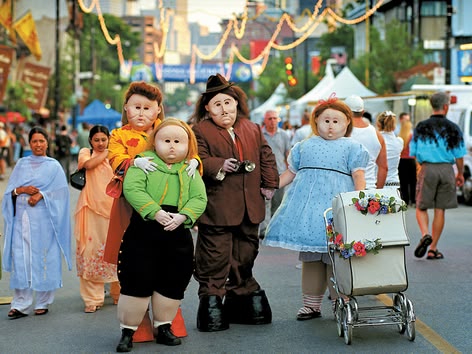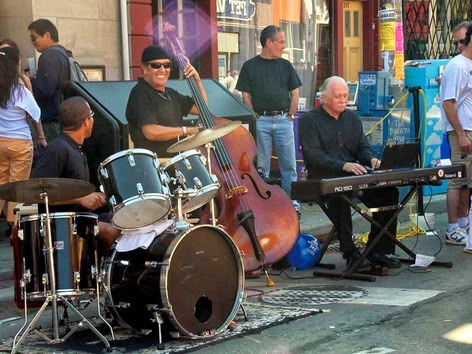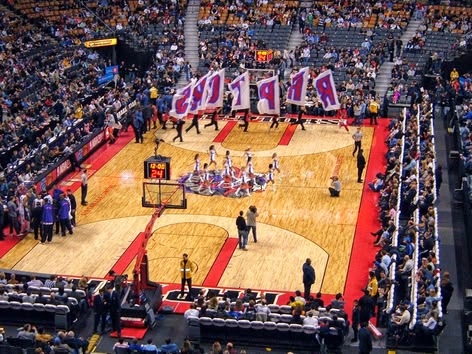Travel guide for Canada
Canada is located on the North American continent. It is the second largest country in the world with an area of 9,984,670 km², which makes it fall into 6 different time zones. The country is characterized by its vast uninhabited natural areas, which occupy almost 70% of its surface. The biggest attractions include Banff National Park in the Rocky Mountains and Niagara Falls on the border with the USA.
Canadian culture is deeply influenced by early European immigrants, most of them from Great Britain, France and Ireland. In recent decades, there have also been large influxes of immigrants from Asia, the Caribbean and Africa who brought their traditions with them, traditions that were incorporated into the larger Canadian one. For example, the Chinese New Year is celebrated in Vancouer and the Caribana parade is celebrated in Toronto.
The largest cities in Canada, besides the capital, are Ottawa, Toronto, Vancouver, Montréal and Quebec. There are also eighteen UNESCO World Heritage sites worth seeing.
Geography
Time zone
Climate and travel seasons
Climate chart for Ottawa (in degrees Celsius)
| January | February | March | April | May | June | July | August | September | October | November | December | |
|---|---|---|---|---|---|---|---|---|---|---|---|---|
|
|
-4° | -2° | 3° | 12° | 20° | 26° | 27° | 27° | 22° | 15° | 7° | -1° |
|
|
-14° | -13° | -8° | 1° | 7° | 13° | 15° | 14° | 9° | 3° | -3° | -10° |
|
|
2hrs | 1hr | 3hrs | 4hrs | 5hrs | 5hrs | 6hrs | 6hrs | 5hrs | 3hrs | 4hrs | 1hr |
|
|
20 | 15 | 16 | 16 | 19 | 18 | 18 | 16 | 17 | 18 | 20 | 19 |
Climate chart for Vancouver (in degrees Celsius)
| January | February | March | April | May | June | July | August | September | October | November | December | |
|
|
6° | 8° | 11° | 14° | 18° | 22° | 23° | 23° | 19° | 14° | 10° | 7° |
|
|
1° | 0° | 3° | 5° | 8° | 11° | 12° | 11° | 10° | 7° | 4° | 2° |
|
|
2hrs | 3hrs | 4hrs | 6hrs | 7hrs | 7hrs | 10hrs | 8hrs | 6hrs | 4hrs | 2hrs | 1hr |
|
|
9° | 8° | 8° | 9°0 | 11° | 13° | 14° | 15° | 13° | 12° | 11° | 8° |
|
|
15 | 14 | 14 | 11 | 9 | 7 | 5 | 5 | 8 | 12 | 17 | 17 |
Requirements for entering Canada
The application requires a valid passport, an e-mail address and a credit card (Mastercard, Visa, American Express) to pay the fee. The online form is currently only available in English or French.
Currency
One Canadian dollar is equivalent to 100 cents. There are 5, 10, 20, 50, 100 dollar bills and 1, 5, 10, 25, 50 cent and 1 and 2 dollar coins. There used to be a 1000 dollar bill, but it has been withdrawn, although it is still recognised as official currency.
Health care
Hospital fees for foreign visitors are either calculated according to daily rates or according to the specific illness and the duration of the hospital stay, but can usually be very high. Before you travel, you should therefore make sure that your health insurance policy also covers non-European countries or take out appropriate travel health insurance.
TIP: Pay by credit card, take the bill with you and submit it to the insurance company later at home. Saves both you and the hospital staff a lot of time and stress!
West Nile fever season begins in June. This flu-like viral illness is transmitted by mosquitoes. Since severe complications can occur with the disease, special protection against mosquitoes is recommended during this time. Otherwise, standard vaccinations are sufficient for a trip to Canada. The meningitis vaccination is one of the standard ones in Canada and is one recommended ones to do before travelling.
Packing checklist
Religion
Politics
Local language and communication
Public transport
History
Native Americans were the first inhabitants of Canada around 12000 BC. After them, the Inuit came into the land around 5000 BC. Vikings were the first Europeans to live on this land, also known as Newfoundland, in 1000 BC. The Frenchman Jacques Cartier first claimed ownership over regions of Canada in 1534. These regions then became French land. The city Québec was founded by Samuel de Champlain in the 16th Century. Many French people then began to migrate to Canada and create settlements in the years to come. British settlers also came to the land in 1670.
After a few peaceful centuries, the Seven Years War between the English and the French began. In 1763 France gave their ownership rights to Great Britain with the Treaty of Paris. After the U.S. War of Independence (1775-1783), Canada experienced the first wave of immigration of British Loyalists. From 1812 to 1814 followed the British-American War, which ended inconclusively and was concluded with the Peace of Ghent.
In 1867, Canadian Confederation occurred and Canada was declared a federal state by Great Britain, which now had autonomy from Great Britain. By 1912, all provinces (except Newfoundland in 1949) had joined Confederation. Canada voluntarily became a member of the Commonwealth in 1931.After World War II, Canada experienced a large wave of immigration from Europe, India, the Far East, and the Caribbean, which resulted in a significant economic boom. Land treaties were signed with the aborigines, who got back parts of land in the north. There were also tensions between English-speaking Canada and the French province of Quebec, which demanded more independence. However, this was rejected by a narrow majority.Festivals in Canada
Igloofest: (January) Are you a fan of electronic music? Then you cannot miss Igloofest in Montréal! The festival takes place at an igloo village with music from local and international DJ's and a snowsuit competition!
Montréal En Lumière: (February-March) At this festival you can expect not only a winter wonderland with a ferris wheel, but also light shows, performances, a long zipline and great culinary highlights. But the best thing has to be the Nuit Blanche, an incredible art night with over 200 free events.
Fireworks Festival: (June) L'International des Feux Loto-Québec is an international fireworks competition in which major companies showcase the latest techniques and innovations in the field of pyrotechnics. The park itself also offers a lot of entertainment: with a huge range of music, dance and theater shows, sporting events and leisure activities, getting bored is impossible!
Just for Laughs Festival: (July) Looking for a good laugh? The world's largest comedy festival has been held in Montréal every year since 1983. A selection of the best-known comedians and newcomers perform here under the motto "Make People Happy".
International Jazz Festival: (September) The annual jazz festival attracts more than 2 million visitors. Every year about 3000 artists perform and more than 650 concerts are there to entertain you. Many of these concerts can even be attended for free!International Film Festival: (September) The Toronto Film Festival (TIFF) is one of the largest and most vibrant film festivals in the world. This festival lasts for 10 days and during this time you can expect about 450,000 film fans in Toronto. There you can see stars and movies. The films that are shown there range from documentaries to foreign films and Hollywood hits.
Comedy Festival: (September) You love to laugh? Then the Comedy Festival will make you laugh out loud like never before! Throughout 10 days you'll be able to attend countless live performances. Comedians like John Mulaney or Ali Wong are just some of the big names in the world of comedy to have performed here.
Cloverdale Rodeo & Country Fair: (May) Rodeos are one of the biggest traditions in Western Canada. The world's best cowboys and cowgirls show off their impressive skills for an amazing set of events. The Country Fair offers entertainment especially for families with go-karts, petting zoo, country music and many other activities.
International Jazz Festival: (June - July) Jazz lovers will get their money's worth at this festival. With the motto "For the Love of Jazz", this festival offers high-quality concerts and promotes creative, improvised music. Outside the festival season, concerts are also held regularly at Frankie's Jazz Club.
Food Cart Festival: (August) Want to try typical Vancouver food? The Food Cart Festival is a weekend-long event that gives you the opportunity to experience the culinary culture of Vancouver and beyond. During the festival you will experience all you can eat menus, cocktail and beer gardens, live music as well as long table dinners. The highlight of the festival is definitely the Street Food Showdown in the Olympic Village.
Eastside Culture Crawl: (November) 25000 visitors come to the Cultural Crawl every year, to see designs and crafts made by over 480 artists and crafts people. The goal of this festival is to promote and support the artists, whilst also creating further public awareness of these arts by hosting various workshops and seminars about them. This Festival is also completely free of charge!
Rifflandia Festival: (August) Rifflandia is a 4-day music festival that takes place between the last weekend of August and the last weekend of September at the Royal Athletic Park. During the festival zou will be able to see over 300 artists at more than 10 different venues! Due to the eccentric program and the different venues and shows, the festival attracts thousands of people every year.
Dragon Boat Festival: (August) The Dragon Boat Festival has been held every August for the last 20 years. But don't worry if you don't make it to Canada for August, the dragon boats can be seen in the harbor already from February because of their growing popularity. During the festival visitors can also enjoy the Festival of Lights, the beer garden, or the "Eye Dotting Ceremony". Fringe Festival: (August-September) Every summer Victoria hosts the Fringe Festival. Visitors can look forward to live performances from around the world. This event features an electric mix of spoken word, drama, musicals, dance, comedy, magic and theater. International Chalk Art Festival: (September) The largest street art festival in Canada showcases the cultural diversity of Downtown Victoria at the port of Victoria. You can admire chalk artworks (even in 3D!) made by professional artists for free. You will also be able to enjoy live music outdoors whilst viewing the artists' work.Holidays
- The Monday before or on May 24 is Victoria Day (Fête de la Rein), celebrating the birthday of the reigning British monarch
- July 1 is Canada Day (Fête du Canada), commemorating the formation of Canada as a state of the British Commonwealth by the British North America Act on July 1, 1867
- The first Monday in August is Civic Holiday (Premier lundi d'août)
- The first Monday in September marks Labor Day (Fête du travail)
- The second Monday in October marks Thanksgiving (Action de grâce). On this day, Canadians, just like the U.S., celebrate how the Pilgrim Fathers landed at Plymouth Rock and were welcomed by the Wampanoag Indians and feasted together.
- On November 11, the day of the armistice in World War I, Canadians celebrate Remembrance Day (Jour du Souvenir). It is intended to commemorate the war veterans.
Food
Tourist mistakes
In Canada there is a sales tax of 5%, plus regional taxes of up to 8%. All products are priced without taxes, which are added at the time of sale. This also applies to menus in restaurants!
The purchase and consumption of alcohol is allowed for people over 19 (exception: 18 years in Alberta, Manitoba, Quebec). Drinking alcohol in public is strictly prohibited. Alcohol may only be consumed within licensed premises or at home.
Advice & tips
Short dictionary
| English | French |
| Hi! | Salut! |
| Good Morning! | Bonjour! |
| Good evening! | Bonsoir! |
| Welcome! | Bienvenue! |
| How are you? | Comment vas-tu? |
| Good, thank you | Bien, merci! |
| How about you? | Et toi? |
| Thank you (so much) | Merci (beaucoup)! |
| You're welcome | De rien! |
| Good night! | Bonne nuit! |
| See you later | À plus tard! |
| Bye! | Au revoir! |
| I am lost | Je suis perdu |
| Can I help you? | Puis-vous aider? |
| Can you help me? | Pouvez-vous m’aider? |
| Where is the toilette/ the pharmacy? | Où se trouvent les toilettes? Où se trouve la pharmacie? |
| Do you speak (English)? | Parlez-vous (anglais)? |
| My name is… | Je m’appelle... |

